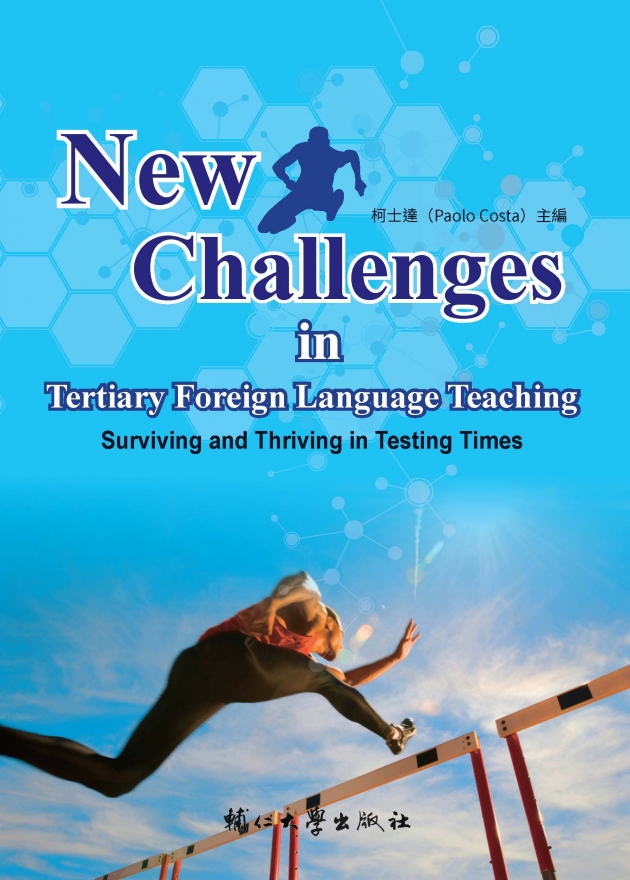New Challenges in Tertiary Foreign Language Teaching: Surviving and Thriving in Testing Times
New Challenges in Tertiary Foreign Language Teaching: Surviving and Thriving in Testing Times
作者:柯士達 ( Paolo Costa ) 主編
出版年份:2021/05
語言:英文、德文、西班牙文、義大利文
叢書名號:輔仁大學研究叢書231
ISBN:9789860729238(平裝);9789860729245(PDF)
定價:250元
出版年份:2021/05
語言:英文、德文、西班牙文、義大利文
叢書名號:輔仁大學研究叢書231
ISBN:9789860729238(平裝);9789860729245(PDF)
定價:250元
作者:柯士達 ( Paolo Costa ) 主編
出版年份:2021/05
語言:英文、德文、西班牙文、義大利文
叢書名號:輔仁大學研究叢書231
ISBN:9789860729238(平裝);9789860729245(PDF)
定價:250元
出版年份:2021/05
語言:英文、德文、西班牙文、義大利文
叢書名號:輔仁大學研究叢書231
ISBN:9789860729238(平裝);9789860729245(PDF)
定價:250元
出版品說明
本書集結六篇論文(第一、三、四、六篇德文,第二篇西班牙文,第五篇義大利文),本書為因應時代變遷下的教育環境及學生職涯挑戰,在教學方法上所提出新的論述及建構。
This book contains essays by various teachers from different universities and departments with the aim of presenting modern teaching methods for the changed learning and study conditions on the basis of theoretical preliminary considerations. Language teachers at Taiwanese universities often encounter similar difficulties in designing lessons: students’ increasing frustration and lack of motivation. Many students experience a high level of frustration and demotivation; they cannot find future prospects in language studies. Confronted with reality of time-consuming internships, part-time jobs and life, many students become painfully aware that a linguistic degree won’t prepare them for later work or provides career opportunities. In addition, they realize their low language skills and life experiences. Aware of that problem, the language departments have to find new teaching methods and create curricula which increase the interest of the students and prepare them for professional life. Many students studying in the language departments will later find a job in trade or business. The universities are therefore increasingly shifting their curriculum away from classic language studies to professionally oriented teaching, including business communication or translation related to cross cultural training. The authors introduce modern teaching methods to meet the aforementioned challenges for business and cross-cultural courses. Although the contributors explain their methodical approach, the teaching methods are described and evaluated on case studies and surveys. The publication offer suggestions for course outlines.
This book contains essays by various teachers from different universities and departments with the aim of presenting modern teaching methods for the changed learning and study conditions on the basis of theoretical preliminary considerations. Language teachers at Taiwanese universities often encounter similar difficulties in designing lessons: students’ increasing frustration and lack of motivation. Many students experience a high level of frustration and demotivation; they cannot find future prospects in language studies. Confronted with reality of time-consuming internships, part-time jobs and life, many students become painfully aware that a linguistic degree won’t prepare them for later work or provides career opportunities. In addition, they realize their low language skills and life experiences. Aware of that problem, the language departments have to find new teaching methods and create curricula which increase the interest of the students and prepare them for professional life. Many students studying in the language departments will later find a job in trade or business. The universities are therefore increasingly shifting their curriculum away from classic language studies to professionally oriented teaching, including business communication or translation related to cross cultural training. The authors introduce modern teaching methods to meet the aforementioned challenges for business and cross-cultural courses. Although the contributors explain their methodical approach, the teaching methods are described and evaluated on case studies and surveys. The publication offer suggestions for course outlines.

